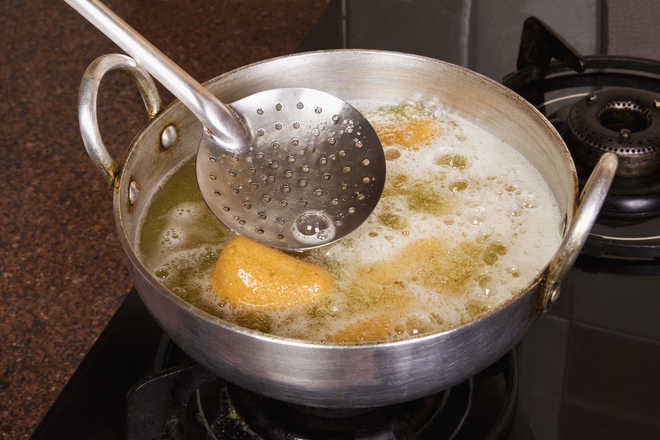
Manav Mander
Tribune News Service
Ludhiana, November 18
Re-heating and re-using oil for frying is a common practice in most of the Indian households. However, the Food Safety and Standards Authority of India (FSSAI) warns against the exercise.
In its guidelines issued recently, the FSSAI has stated that one should avoid the repeated use of cooking oil.
Homemakers tend to refill their oil dispensaries with fresh cooking oil while some of the old stock already remains in the dispenser and big companies, involved in the business of frying products, dispose of their used cooking oil (UCO) for industrial purposes such as manufacturing soaps. Discarding the UCO in household becomes problematic because if it is drained off, it leads of choking of sewers and pipes. The FSSAI has notified that the limit of total polar compounds in oil should not be more than 25 per cent as it helps in the safe disposal of the UCO.
The FSSAI recommends that one should avoid the repeated use of cooking oil at household level and oil once used for frying should be filtered and be used for preparing curry to make it economical. Used cooking oil should be consumed in a day or two as the rate of deterioration is higher in it. /The UCO should be disposed of in an environment-friendly way — by providing it to the authorised UCO collection agencies. In order to dispose off small quantities at household level, it should be mixed with absorbent material such as sand or saw dust or used towel or paper towel to avoid spillage and then throw it in the dustbin.
City-based physician Dr Subhash Gupta said when the oil is used frying, its quality deteriorates. “Using the same oil repeatedly for frying leads to change in its physico-chemical nutritional and sensory properties. It leads to the formation of compounds unfit for human consumption beyond certain limits. These compounds have been related to various diseases such as hypertension, liver diseases and Alzheimer,” he said.



























